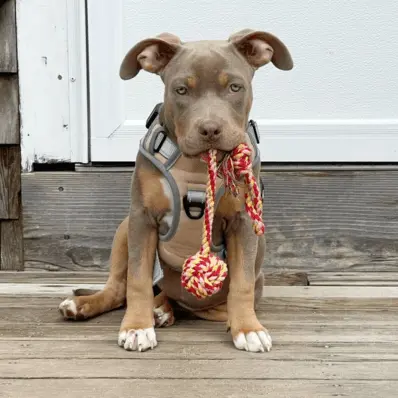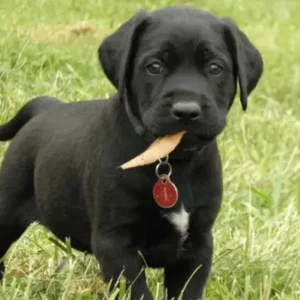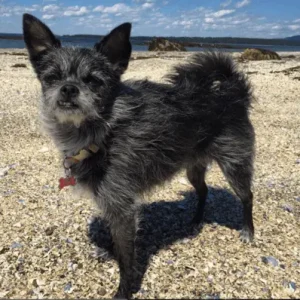American Pit Bull Terrier History
The American Pit Bull Terrier was first bred in England in the early 1800s by mixing Bulldogs and Terriers. These dogs were originally bred for bull-baiting, a popular spectator sport at the time. However, when bull-baiting was outlawed in 1835, these dogs were used for fighting and weight-pulling. Dog fighting became a popular underground activity in the United States during the 1800s.
Bulldog- Source: AKC.org
Bull terrier- Source: Britannica
Pit Bulls were brought to America by English immigrants looking for a new home for their dogs. These mixed breed dogs quickly became popular in America due to their strength. In 1898, the United Kennel Club (UKC) was founded, and they recognized the American Pit Bull Terrier as a distinct breed.
Recognizing the breed’s potential as companion dogs, American breeders began to selectively breed Pit Bulls for these traits. Over time, the American Pit Bull Terrier became known for its gentle nature, intelligence, and unwavering loyalty to its family.
Despite their troubled past, these dogs have proven themselves to be loving companions and valuable members of society when given the chance.
American Pit Bull Terrier Personality
The American Pit Bull Terrier has a wonderful personality that’s all about being friendly, loyal, and playful. These dogs love spending time with people and are known for their affectionate nature.
Despite their strong muscles, PitBulls are gentle giants who enjoy playing fetch and going for walks. They’re also really smart and can learn easily through positive reinforcement. Plus, they’re super protective of their family, always ready to stand up for them.
- American Pit Bull Terrier Temperament
This dog breed has a great mix of strength, kindness, and friendliness in its temperament. Because they love being around people and have a tendency to please them, they are not considered the best guards or watchdogs.
Pit Bulls make strong connections with their human family and show lots of loyalty and love, always eager to please them. They love having fun and playing games that get them moving and thinking. Even though they’re big dogs, they’re gentle with children and get along well with other pets.
Ensuring they are trained and socialized properly helps them stay happy and well-behaved. Overall, Pit Bulls are loving and adaptable pals that make wonderful companions for anyone lucky enough to have them.
- Misconceptions About Their Aggression
American Pit Bull Terriers are usually friendly and affectionate dogs, despite their unfair reputation for being aggressive. They can make great family pets if raised responsibly. It’s best to introduce them to older children because of their size and energy, which can lead to accidents during playtime. Socializing them early is important to prevent aggressive behavior towards other dogs.
American Pit Bull Terrier Physical Appearance
The American Pit Bull Terrier is a medium-sized breed with a muscular build and a powerful stance. They have a broad head with strong jaws and a well-defined muzzle. Their eyes are round and expressive, conveying intelligence and warmth.
- Size
The American Pit Bull Terrier is a medium-sized breed that exudes strength and agility. They typically stand between 17 to 21 inches tall at the shoulder for males and 16 to 20 inches for females.
The typical American Pit Bull Terrier’s weight ranges from 30 to 50 pounds, while males can weigh up to 60 pounds. Despite these general guidelines, individual Pit Bulls may vary slightly in size and weight based on genetics and environmental factors.
- Coat Colors
One of the most striking features of the Pit Bull is its coat, which comes in a wide range of colors and patterns. Common coat colors include brindle, black, blue, white, fawn, and red, among others.
Some Pit Bulls may exhibit solid colors, while others may have patches or markings of white or other colors on their coat. The patterns and colors of a Pit Bull’s coat can be quite diverse, adding to the breed’s unique and appealing appearance.
Red American Pit Bull Terrier- Source: AKC.org
Black American Pit Bull Terrier- Source: Pinterest
White American Pit Bull Terrier- Source: Audacy
Black and Tan American Pit Bull Terrier- Source:American Dog Breeders Association
Fawn American Pit Bull Terrier- Source: American Dog Breeders Association
American Pit Bull Terrier Gender Differences
When it comes to American Pit Bull Terriers, there are noticeable physical and temperamental differences between males and females.
- Physical Characteristics
Male Pit Bulls are typically larger and heavier, with broader heads and more muscular builds. Their eyes are often closer-set.
Female Pit Bulls tend to be smaller and slimmer, with narrower heads and softer features. Their eyes are usually set slightly wider apart.
- Temperament Traits
Male Pit Bulls may be more challenging to train as puppies but tend to form strong bonds with their families and have higher energy levels. They’re generally less suspicious of strangers.
Female Pit Bulls are often easier to train from a young age and tend to be more connected to their owners. They may have slightly lower energy levels and can be more cautious around unfamiliar people.
- Health Considerations
Males are more prone to bone injuries, joint problems, and bladder infections. Females, if not spayed, are at risk of developing uterus infections and may also be susceptible to breast tumors and cancers.
With proper training, socialization, and care, both male and female Pit Bulls can make loving and devoted companions for their owners.
American Pit Bull Terrier Feed/Nutrition
When it comes to feeding your American Pit Bull Terrier, it is important to remember that they are a very active breed. They need a diet that provides the energy necessary to stay active.
To make sure your American Pit Bull Terrier is getting the food they need, feed them dry food that is high quality and meant for active dogs.
This breed is prone to weight gain. That means you’ll need to be careful not to overfeed your dog. A good rule of thumb is to feed your APBT twice a day. Once in the morning and once at night, ensure each meal is no more than 1/2 cup of food.
There are a few options regarding what food to feed your APBT. You can choose what to feed your dog. You can either give them commercial dry food, commercial wet food, or a homemade diet.
Homemade diets are becoming increasingly popular among dog owners because they offer complete control over what goes into your dog’s food. You can include healthy options like shrimp and cucumbers in your dog’s diet for added variety and nutrition.
Remember to portion your dog’s food according to his age, activity level, and size.
American Pit Bull Terrier Health
Pit Bulls are generally healthy dogs but may be prone to certain genetic conditions that you should be mindful of before welcoming them into your homes:
- Hip Dysplasia: Hip dysplasia, a common issue among American Pit Bull Terriers, involves the improper development of the hip joint, leading to discomfort and reduced mobility. Management typically includes weight control, physical therapy, and sometimes surgery.
- Heart Disease: Pit Bulls are prone to heart conditions such as valve diseases and dilated cardiomyopathy, which can cause symptoms like coughing and lethargy. Regular vet check-ups and a balanced lifestyle help manage heart health.
- Allergies: Skin irritations, itching, and ear infections are common allergic reactions in Pit Bulls, triggered by factors like pollen, food, or fleas. Managing allergies involves identifying triggers and using medications as needed, along with proper grooming.
- Cancer: Certain cancers like mast cell tumors and lymphoma are more prevalent in American Pit Bull Terriers. Early detection through vet exams is vital, and treatment options may include surgery, chemotherapy, or radiation therapy, along with maintaining overall health through diet and exercise.
- Cataracts: Cataracts, a prevalent eye condition seen in various dog breeds like the Pit Bull Terrier, involve the formation of cloudy or opaque areas within the eye’s lens, potentially leading to vision impairment and eventual blindness. Symptoms of cataracts can manifest as cloudy vision, light sensitivity, and behavioral changes like bumping into objects or disorientation.Treatment usually entails cataract surgery performed by a veterinary ophthalmologist.
- Obesity: Pit Bulls have a tendency of obesity, which increases their risk of developing various health issues. Ensuring they maintain a healthy weight through a well-balanced diet and consistent exercise regimen is crucial for their overall health and well-being.
To prevent health issues in American Pit Bull Terriers like any other dog breed, prioritize responsible breeding. Maintain a healthy weight through balanced nutrition and exercise. Identify and avoid allergens. Schedule regular veterinary check-ups. Provide a nutritious diet rich in antioxidants. Support overall eye health through proper care. These measures promote the well-being of Pit Bulls and reduce the risk of common ailments.
American Pit Bull Terrier Care and Grooming
Taking care of your American Pit Bull Terrier’s grooming needs is essential for keeping them healthy and happy.
While their short coat doesn’t require much maintenance, weekly brushing is important to remove any dirt or tangles.
Regular baths using gentle dog shampoo and trimming their nails every few weeks are important tasks to keep them looking and feeling their best.
Don’t forget to clean their ears regularly with a gentle solution to prevent infections, and brush their teeth several times a week to maintain dental health.
By incorporating these simple grooming practices into your Pit Bull’s routine, you can ensure they stay comfortable and clean. Consistent potty training a dog is also key to maintaining good hygiene and preventing accidents.
American Pit Bull Terrier Rescue Groups
If you’re considering American Pit Bull Terrier adoption, there are several rescue groups dedicated to the welfare of Pit Bulls, offering them a chance at a loving home.
Interesting Facts
- Pit Bulls are ranked as the 4th most gentle breed by the American Temperament Test Society, showcasing their true nature as affectionate and loyal companions.
- Pit Bulls have a rich history of serving as working dogs, family companions, and even as “nanny dogs” for their gentle nature around children. Their versatility and loving disposition have endeared them to families for generations.
- Pit Bulls have made notable appearances in the media. For instance, Petey from the Our Gang comedy shorts became an iconic figure, charming audiences with his endearing antics. Additionally, a Pit Bull named Stubby served as a mascot in World War I, earning recognition for his bravery and loyalty on the battlefield.
- They have been featured in films and television shows like “Once Upon a Time in Hollywood” and “Veronica Mars.”
Best For
Pit Bulls excel as family companions, therapy dogs, and even athletes in sports like agility and weight pulling.
American Pit Bull Terrier Top Names
| Male American Pit Bull Terrier Names | Female American Pit Bull Terrier Names |
| Titan | Nova |
| Maverick | Zara |
| Atlas | Ember |
| Thor | Cleo |
| Apollo | Athena |









 Bulldog- Source:
Bulldog- Source:  Bull terrier- Source:
Bull terrier- Source: 

 Red American Pit Bull Terrier- Source:
Red American Pit Bull Terrier- Source:  Black American Pit Bull Terrier- Source:
Black American Pit Bull Terrier- Source:  White American Pit Bull Terrier- Source:
White American Pit Bull Terrier- Source:  Black and Tan American Pit Bull Terrier- Source:
Black and Tan American Pit Bull Terrier- Source: Fawn American Pit Bull Terrier- Source:
Fawn American Pit Bull Terrier- Source: 







